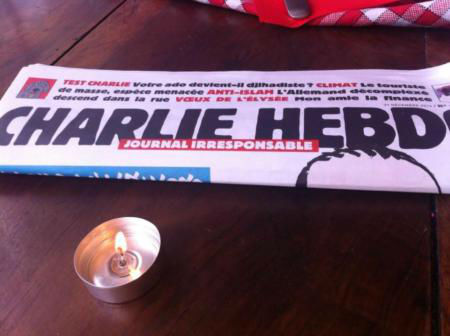True satire defends what is sacred, instead of belittling it
The following unsigned editorial appeared in the Jan. 26 issue of the Western Catholic Reporter, newspaper of the Archdiocese of Edmonton, Alberta. It was written by Glen Argan, editor and general manager.
The terrorist attacks that killed 12 people at the French satirical magazine Charlie Hebdo on Jan. 7 have rightly been described as acts of "indescribable barbarity." They were a direct assault on the sanctity of human life and the peaceful order of democratic society.
However, before we make the French cartoonists into innocent martyrs to the cause of free speech, we ought to reflect on the nature of satire. The terrorist attack has created a rush of people who defend the right of cartoonists to lampoon people's most basic beliefs and to treat nothing, absolutely nothing, as sacred.
Such, however, is not the only form of satire. Satire can have a moral purpose -- as opposed to the amoral purpose of Charlie Hebdo -- when it ridicules the pomposity and excesses of the wealthy and powerful. The purpose of such satire is not to destroy, but to inspire justice for the oppressed. Such satire is rooted in the sacred, not opposed to it.
We do not have to look far to find responsible satire. The best editorial cartooning in daily newspapers assumes just that -- that there are principles of justice that ought to be maintained and that perhaps the most effective way to speak against the violation of such principles is, not with reasoned argument, but with ridicule.
The Charlie Hebdo cartoonists, in contrast, strike against the core of human dignity, the sacred center of the human person which yearns for union with God. That sacred center typically expresses itself through fidelity to one of the great religions. To ridicule, especially with ongoing fervor, the central beliefs of a religion is a psychologically and spiritually violent attack on the dignity of adherents of that religion.
The Second Vatican Council's Declaration on Religious Freedom declared that people have an obligation to seek religious truth, an obligation that requires "psychological freedom and immunity from external coercion." When people do seek religious truth, it should inspire in us, not ridicule, but profound respect.
Most, if not all, religions have checkered histories. Sometimes their leaders have provoked wars and persecution in the name of God. Such religious violence ought to be criticized, and it is a suitable subject for satire.
Religions, however, have also suffered persecution. In the case of Islam, there is a long history of subjugation by what Muslims see as the Christian West. From the Muslim point of view, the Charlie Hebdo cartoonists are but the latest Western assault on their deepest religious beliefs.
This is no excuse for terrorism. But freedom of speech is not a license to ridicule everyone and everything. The right to free speech is rooted in respect for human dignity. Yet respect for that dignity was severely lacking in the cartoons that provoked the terrorists' wrath.
- - -
The views or positions presented in this or any guest editorial are those of the individual publication and do not necessarily represent the views of Catholic News Service or of the U.S. Conference of Catholic Bishops.



















